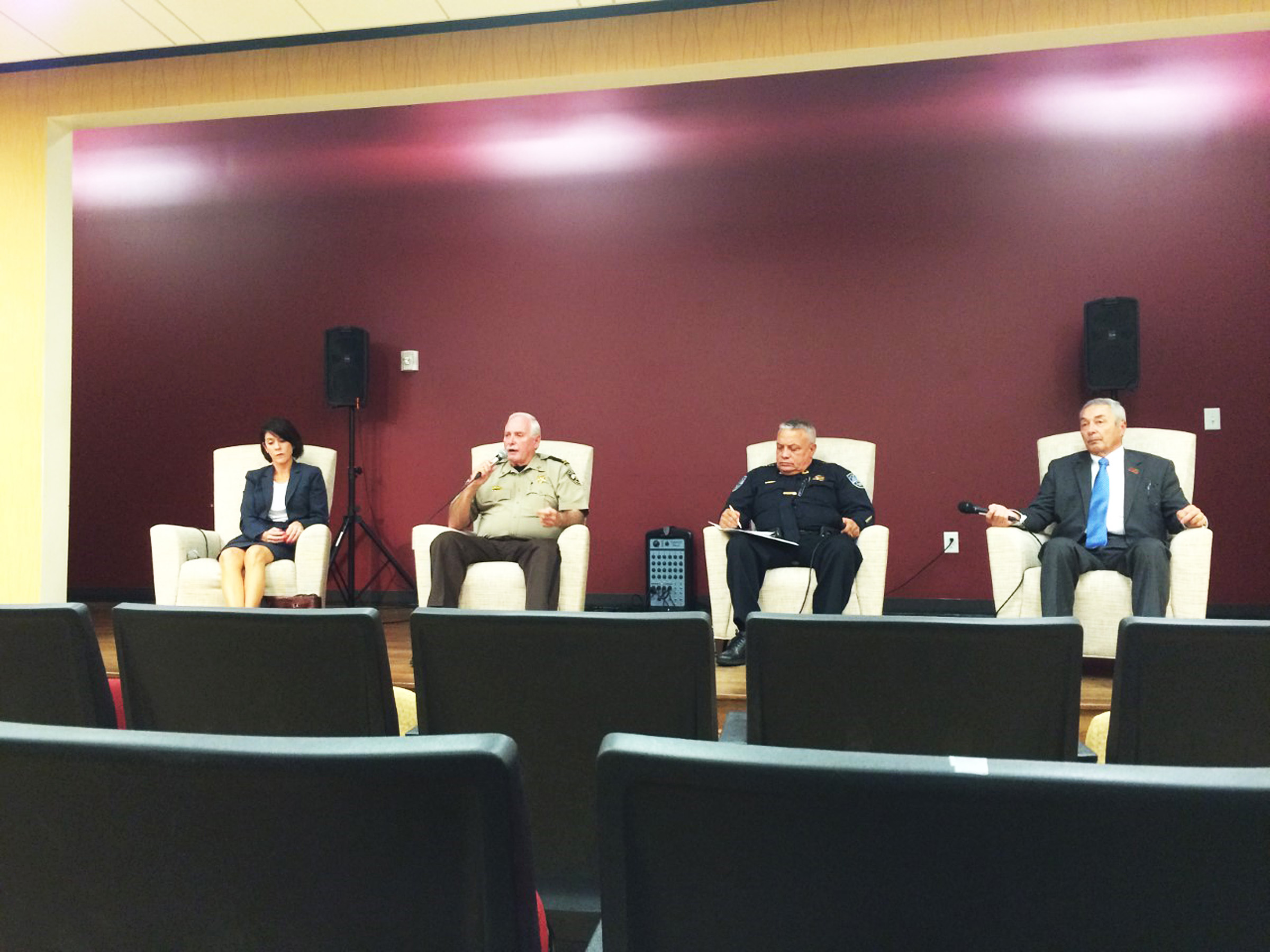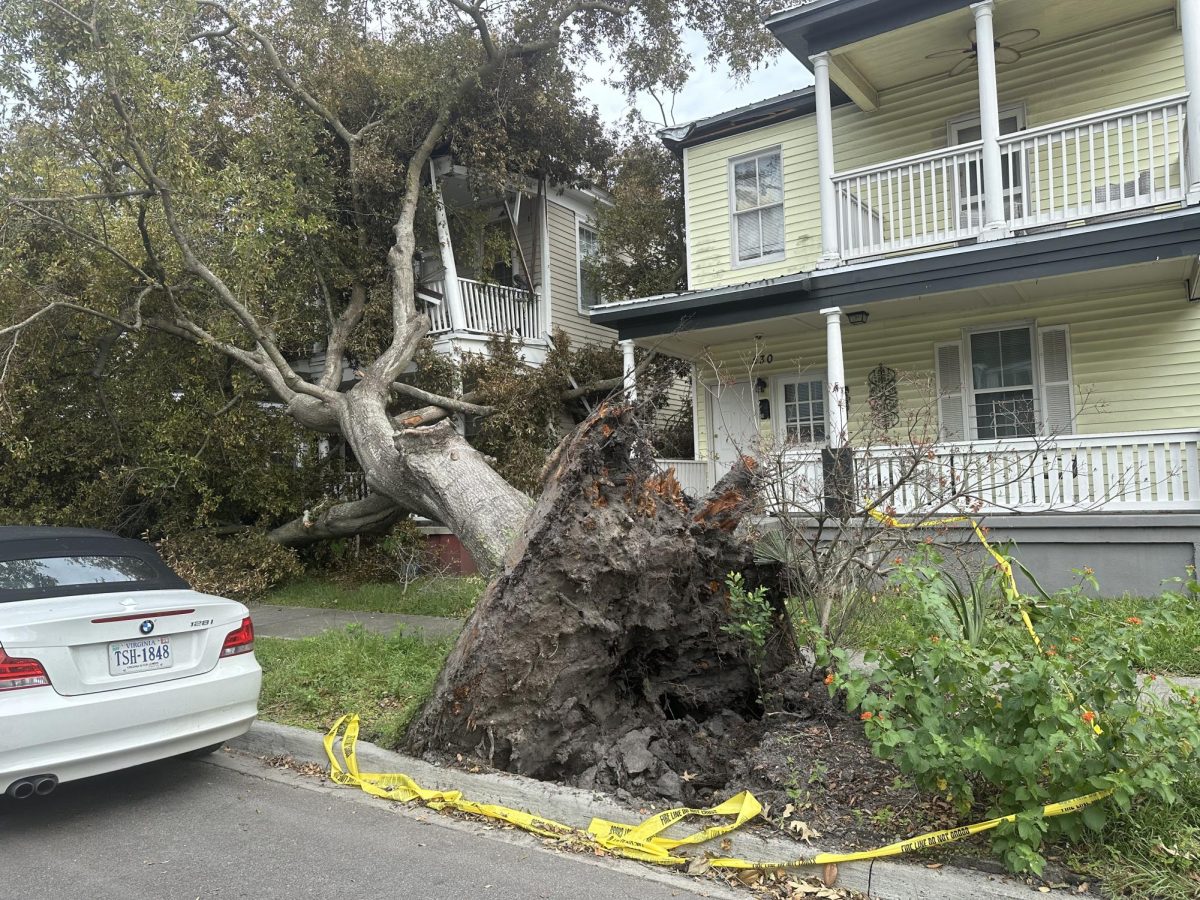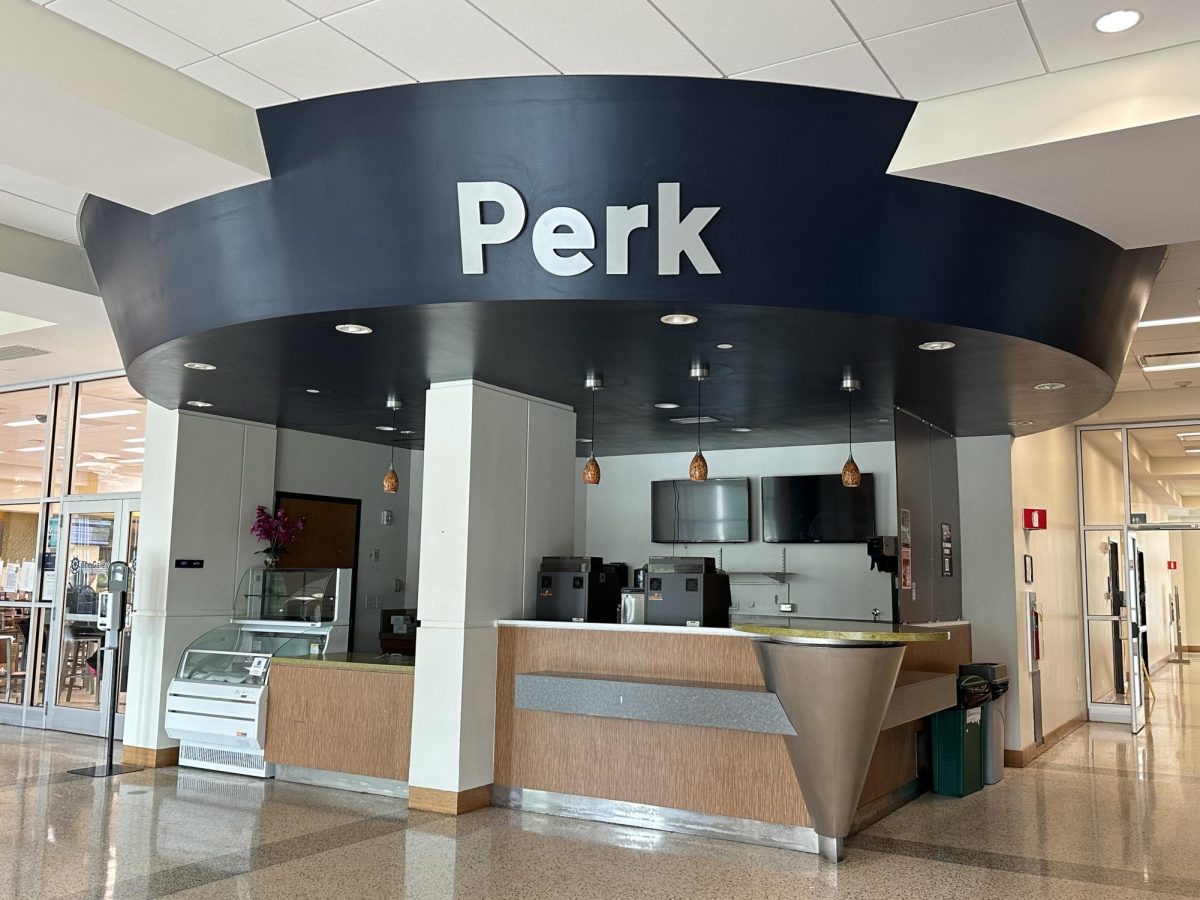Taylor Thomas, Staff Writer

On Sept. 27 the offices of the President, Provost and Vice President of Student Affairs hosted a conversation on 21st century policing. A panel of four including Chatham County District Attorney Meg Heap, Savannah-Metropolitan Police Chief Joseph Lumpkin, Chatham County Sheriff John Wilcher and Armstrong Police Chief Wayne Wilcox were invited to interact with the audience in a Q&A setting of discussion.
The conversation, a highly relevant one due to recent police shootings in various parts of the United States, was organized to create a safe space for the Armstrong community to talk about policing. Students, faculty, staff and members of the Savannah community gathered to discuss this controversial and at times, uncomfortable topic.
The panel answered a variety of questions pertaining to trust, racial bias, accountability, transparency and community policing. Audience members were able to text in questions for anonymity or ask the panel questions directly.
Meg Heap, Chatham County district attorney, provided her perspective on the topic as the DA and an active member of the justice system.
“In our office, we do work with law enforcement every day. We receive cases from the sheriff and the chief. We also have to prosecute law enforcement officers and what we look at are the facts and the evidence — they are held to the same standard in terms of if a crime has been committed and they are also held to the same standard in terms of if there is a defense that they can put forward,” Heap said.
Joseph “Jack” Lumpkin, Savannah-Metropolitan police chief in his 47th year of law enforcement, provided a different perspective to the conversation.
“We have some historical baggage, but we’re not living in the 1950s or 1980s. We are better now than we’ve ever been. I would suggest to you though that as humans we tend to be attracted by the negative and we look for the negatives,” he said.
“We run approximately 450 calls a day in Savannah; we have 850,000-875,000 officers in this country. An overwhelming number of the responses of officers is great,” Lumpkin added.
After the discussion, students had gathered outside of the Ogeechee Theater lying down on the floor holding signs with the names of those who have died in fatal shootings with the police. Many students unhappy with the discussion participated in the protest.
Senior Professional Communications major Rachel Little was an impromptu participant in the protest.
“I didn’t know about the protest until I walked out. I walked out because I was infuriated and I looked and saw what they were doing and joined,” Little said.
“I think that a lot of the audience’s comments were really insightful, really well-stated and well thought out but a lot of the panel, particularly the Sheriff, gave disappointing answers,” she added.
Several students were upset with Sheriff Wilcher’s answers pertaining to the Black Lives Matter (BLM) movement and other race-related factors within policing.
A question was texted in by an audience member asking both Sheriff Wilcher and Chief Lumpkin how they show support for the 99% of good officers who call out the 1% of officers who may display signs of racism or other -isms, as well as how they deal with white supremacy infiltrating the police and sheriff’s offices and if BLM is understood among officers within their departments.
“Black Lives Matter is an issue that everybody needs to be concerned about,” replied Wilcher, “whether it’s Black Lives Matter or White Lives Matter. My thing is, I think everybody should have their day in court. If a white officer does something wrong or if a black officer does something wrong; that’s why we have the justice system. I don’t think that we as citizens need to take things into our own hands. When you start rioting and start tearing up people’s businesses and things like that it takes away from your job or your profession, or whatever. Again, I think all lives matter,” Wilcher said.
Wilcher went on to add his opinion on racism and white supremacy within his police department.
“About racism, I’ve been in the sheriff’s office for 40 something years and I have never seen any racism or white supremacy or anything like that. In the jail setting I have gangs in the jail; I have over 16 different gang members in the jail itself. None to my knowing are any of my officers gang members,” he said.
Wilcher became the Chatham County sheriff on April 6, 2016 and has served in law enforcement for over 40 years.
“People have different ideas of racism, but if my officer does something wrong you can rest assured that number one, I’m going to investigate it; number two, if it’s serious enough he’s not going to be an officer or she’s not going to be an officer for very much longer because I am not going to tolerate it. Just as I said when I ran for this office, I work for you, the people. Y’all don’t work for me and I’m going to do what’s right,” Wilcher added.
Since Wilcher has taken office, he has prosecuted two officers for violating inmate’s rights and has charged two officers with assault and sexual assault on another officer.
Some members of the audience thought that Wilcher painted a hyper-generalized picture of BLM.
Assistant professor of English Regina Bradley addressed the issue by challenging Sheriff Wilcher’s statement about BLM.
“I’m curious to hear your thoughts about why your understanding of Black Lives Matter is a threat? If you actually look up the background of Black Lives Matter it was started by three queer, black women after the death of Trayvon Martin, and they were talking about not only the physical and emotional violence associated with police brutality, and other forms of state sanctioned violence, but also how do we rectify that, and it has been a peaceful protest,” she said.
“The problem has come in mass media because [BLM] has been enveloped all into one. If there is a riot they are automatically associated with Black Lives Matter and not necessarily the actual organization itself. In the second part of that, there is no universal, core Black Lives Matter. Anybody can say that ‘black lives matter’ and then they are associated with the movement,” Bradley added.
Another audience member addressed the panel on the issue of screening potential police officers for racial bias and racism.
“There are questions we ask on the polygraph about bias,” answered Chief Lumpkin. “Now is that national? No. We [the Savannah-Chatham-Metropolitan Police Department] are nationally accredited, so we keep standards that a lot of police departments don’t. There are about 18,000 police departments in this country and only about 700 are nationally accredited,” Lumpkin said.
Wayne Wilcox, Armstrong’s police chief, offered his thoughts on how Armstrong’s campus police handle bias.
“One of the things that Armstrong does is we put our officers through implicit bias training. You have to remember, the implicit bias that we all have takes a lifetime to learn and to think that we can put on a course that will completely erase that is not realistic… we are looking to make sure our agencies are diversified and that we’re bringing in individuals who represent all walks of life and all different viewpoints,” Wilcox said.
“We hope that these implicit biases that seep into our lives are being dissipated because we are actually finding out the truth. Even though there are differences between individuals there are more commonalities than we thought,” he added.
An Armstrong student closed the Campus Conversation by suggesting to the panel that race needs to be accounted for within law enforcement and shared her hopes for a more unified future between police and minority communities.
“How do all of you plan to address the fact that black people have been at higher risk of unnecessary violence by police and how do you plan to make these relationships less fraught from fear?” she asked.
“I do believe it is a two-way street and the community and law enforcement need to have better mutual relationships and both need to be responsible. But one side has the protection of the state, and the other side has been disenfranchised by the state upon arrival by sea, which means the playing field is systemically now in one side’s favor,” the student explained.
“My parents are older black people who grew up during the tail end of the Civil Rights Movement and to this day they are law-abiding citizens who are afraid to call cops even when they are in danger… this is not to say that the police need to be perfect because perfection is unattainable. But imperfection cannot explain nor excuse the lack of accountability and insensitivity. Your service is appreciated and I hope we can heal the generational trauma caused by those who are supposed to protect us,” she added.
A 2015 study by the Washington Post stated that as of July 10, 2016, “1,502 people have been shot and killed by on-duty officers since Jan. 1, 2015. Of them, 732 were white, and 381 were black (and 382 were of another unknown race).”
The study established that it would be “statistically dubious” to cite such statistics unless one first accounts for population density.
“According to the most recent census,” the article stated, “there are nearly 160 million more white people in America than there are black people. White people make up roughly 62 percent of the U.S. population but only about 49 percent of those who are killed by police officers.”
On the contrary, “African Americans, however, account for 24 percent of those fatally shot and killed by the police despite being just 13 percent of the U.S. population.” This means that African Americans are “2.5 times as likely as white Americans to be shot and killed by police officers,” the article explained.
The thoughts, questions and concerns discussed during this campus conversation suggest that the topic of 21st century policing is a conversation that the campus community may need to continue in order to cultivate dialogue that can promote positive change and bring healing.








